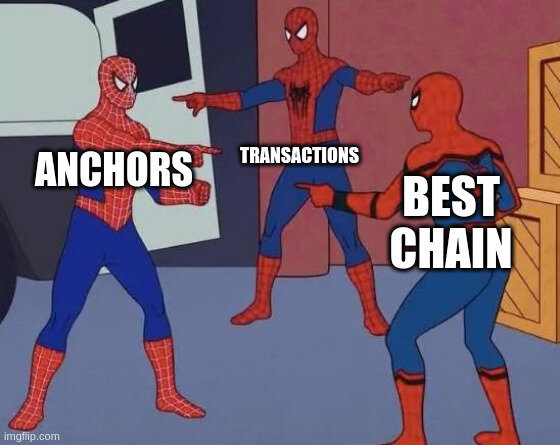Designing `bdk_chain` of BDK v1.0
@evanlinjin
Whoami
- Evan Lin
- Started contributing to BDK (Bitcoin Dev Kit) in 2022
- Implemented a significant portion of the BDK v1.0 refactor
Agenda
- Brief intro to Bitcoin wallets
- Brief intro to BDK
- BDK v1.0 crates
- Design choices of `bdk_chain`
- Non-ambiguous representation
- Monotone data structures
- Always consistent
On-Chain Wallets
What do they do?
On-chain wallets...
-
Manages keychains
- Keychains are deterministic chains of spks
- BIP-32: Deterministic trees of keypairs
- Bitcoin scripts are expressive
-
Monitors the blockchain
- Fetch relevant transactions only
- Block-by-block chain sources
- ScriptPubKey chain sources
-
Creates and sends transactions
- Determine witness data
- Coin selection
BDK (Bitcoin Dev Kit)
How does it make your life easier?
BDK
- Wallet library written in Rust
- Tools (crates, structs, methods, traits) that...
- Manages keychains
- Monitors the blockchain
- Creates and sends transactions
BDK is modular
- Core crates...
- `bdk_chain`: Structures to index and store chain data
- `bdk_coin_select`: 0-dependency crate for coin selection
- Chain-source crates...
- `bdk_electrum`, `bdk_esplora`: spk-based
- `bdk_bitcoind_rpc`: block-based
- Easy-to-use crates...
- `bdk_wallet`
`bdk_chain`
Some design choices
Ambiguous Representation is Bad
Example of ambiguous representation:
blockchain.scripthash.get_history(scripthash)
[
{ "height": 200004, "tx_hash": "acc3758bd2a26f869fcc67d48ff30b96464d476bca82c1cd6656e7d506816412" },
{ "height": 215008, "tx_hash": "f3e1bf48975b8d6060a9de8884296abb80be618dc00ae3cb2f6cee3085e09403" }
]Ambiguous Representation is Bad
get_history(scripthash) -> [ { confirmation_height, txid }, ... ]
Why is this bad?
- Reorgs happen: same height, different block
- Wallets track multiple spks
- Inconsistent history
Non-Ambiguous Representation is Good
In bdk_chain, you need to "anchor" a transaction to a block_height AND block_hash.
pub struct BlockId { pub height: u32, pub hash: BlockHash }
pub trait Anchor {
fn anchor_block(&self) -> BlockId;
/* Hidden methods */
}Does this mean BDK is incompatible with Electrum?
No.
Consistent Transaction Histories from Electrum?
-
Method 1
Get chain tip before and after doing all`get_history`calls.
- Method 2
Use`blockchain.transaction.get_merkle`against fetched transactions.
- For 1, we need a way to know if the tip is still in the best chain.
- For 2, we need to know whether confirmation blocks are still in the best chain.
- We need a way to know which blocks are in the best chain.
crate `bdk_electrum`
`bdk_chain::ChainOracle`
Is the transaction anchored to a block that belongs in the chain identified by `chain_tip`?
pub trait ChainOracle {
fn is_block_in_chain(
&self,
block: BlockId,
chain_tip: BlockId,
) -> Result<Option<bool>, Self::Error>;
/* ... */
}
pub struct BlockId { pub height: u32, pub hash: BlockHash }
Monotone Data Structures
- Updates can be applied in any order (to the structure) and the resultant state will be the same.
- No such thing as invalid representation, elements/contained data cannot conflict.
- Very good for async.
- Easy to work with, hard to screw up.
`bdk_chain::TxGraph`
Example of a monotone data structure.
- Fancy set of
`bitcoin::Transaction`s - Each transaction can have multiple
`Anchor`s - Each transaction has a
`last_seen`(in mempool) timestamp
pub struct TxGraph<A> {
txs: HashMap<Txid, (TxNodeInternal, BTreeSet<A>, u64)>,
spends: BTreeMap<OutPoint, HashSet<Txid>>,
anchors: BTreeSet<(A, Txid)>,
}Putting it all together
Extrapolating a consistent history of transactions
impl<A: Anchor> TxGraph<A> {
pub fn list_chain_txs<'a, C: ChainOracle + 'a>(
&'a self,
chain: &'a C,
chain_tip: BlockId,
) -> impl Iterator<Item = CanonicalTx<'a, Transaction, A>> { /* … */ }
}How `TxGraph::list_chain_txs` works
For each transaction Tn:
- If one of Tn’s anchor points to a block in chain (identified by `chain_tip`), then Tn is confirmed in this chain.
- If Tn conflicts with a confirmed transaction, Tn cannot exist in this chain.
- If Tn conflicts with any unconfirmed transaction(s), Tn can only be in the best chain if it’s last_seen value is greater than all conflicts (tie-break by txid).
pub fn list_chain_txs(&self, chain: &impl ChainOracle, chain_tip: BlockId) -> impl Iterator<Item = CanonicalTx> { /* … */ }Summary
`TxGraph`is a set of transactions,`Anchor`s and last_seen timestamps.`TxGraph`is monotone and can be updated in any order. No invalid representation.`ChainOracle`gives us a view of the chain identified with`chain_tip`(blockhash+height).- We can always get a consistent view of transactions using
`TxGraph::list_chain_txs`.

BDK is
- Modular
- Extendable
- Consistent

Join us on Discord